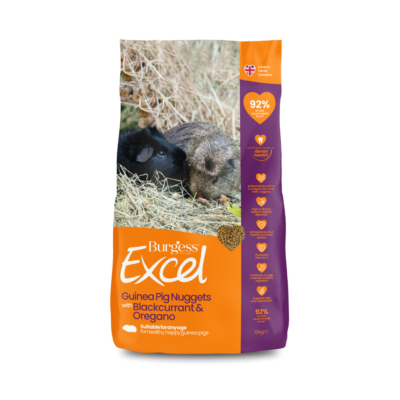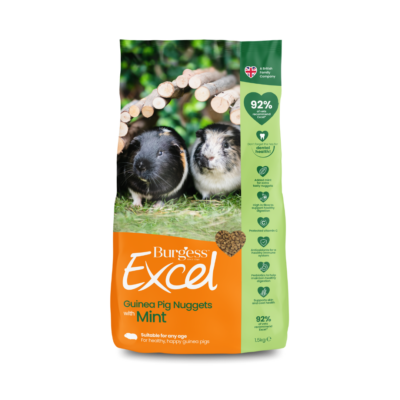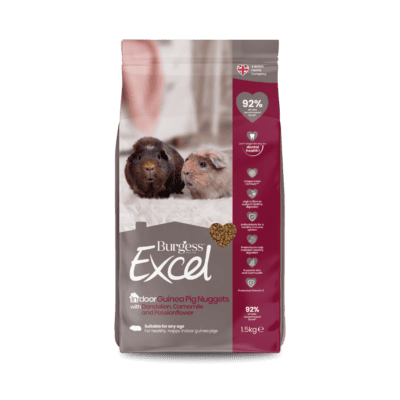
Traditionally thought of as outdoor pets, more and more people prefer to keep their guinea pig friends indoors – and there are lots of good reasons why. Yet, however cosy and stylish your indoor piggies’ home is, it also needs to meet all their health and wellbeing requirements.
With their shy, but curious nature, endearing personalities and adorable purrs and squeaks, what’s not to love about guinea pigs? So, it’s great news that these chatty little cavies are no longer consigned to a small hutch at the bottom of the garden and are now a big part of family life.
The benefits of keeping your guinea pigs indoors
Rehoming charity Wood Green outlines the benefits of keeping guinea pigs indoors, stating: “Your piggies are likely to become more confident around you and being hand fed. You’re more likely to spot health concerns, and these may even be reduced as they will be in a dry, warm environment with a reduced risk of fungal and respiratory issue. They’ll also be safe from wild predators and bad weather.”
Veterinary charity Blue Cross advises: “If your guinea pigs have been living outside then, after a settling in period to adjust to being indoors, most guinea pigs will happily live inside your home as part of the family.”
However, there are quite a few things that your guinea pigs require from their indoor home to feel safe, secure and happy.
FIRST THINGS FIRST, YOUR INDOOR GUINEA PIGS NEED:
- A quiet, calm and safe area in your home away from dogs, cats and other pets they may see as threats.
- Either indoor housing with an indoor run or a guinea pig-proofed room of their own. Ensure flooring is non-slip as slippery floors can cause injury and stress.
- Protection from hazards – for example, all electric cables should be covered, and any house plants should either be safe for guinea pigs or kept out of the way.
- A well-ventilated space, away from radiators. The temperature for your guineas’ housing should ideally be kept at between 17-20oC – some warmer areas of your house may be too hot.
TOP TIP!
Whether your guinea pigs are housed inside or outside, they need the opportunity to run around and explore in a safe area with lots of tunnels, hiding places and deep piles of fresh hay.
A SPACE TO CALL HOME
As a rule of thumb, always provide your guinea pigs with as large accommodation as possible. The RSPCA recommends: “The minimum cage size for two guinea pigs should be 120cm x 60cm x 45cm. A larger cage provides space for the guinea pigs to exercise, as well as giving them plenty of space to run and play. The housing should be smooth bottomed, as wire cages can easily damage your guinea pig’s feet. Indoor style cages with plastic bottoms are ideal for housing indoor guinea pigs.”
Wood Green agrees, advising: “Although guinea pigs are small creatures, they need plenty of space to run around. For inspiration, take a look at some examples from C&C Guinea Pig Cages (C&C stands for Cubes and Correx: the cage walls are made from wire cube grids and the base is durable, easy clean plastic coroplast/correx.) They have a range of affordable modular cages.”
C&C’s Guinea Pig Cages range from a standard cage to cages with hay lofts and non-slip ramps. You can also add cage stands and lids. Kavee also do a similar range with various accessories.
TOP TIP!
Your guinea pigs’ housing should be permanently attached to a larger space within which they can exercise freely at any point in the day or night. This can be a safe guinea pig-proofed room indoors or a large run outdoors.
SOME FINISHING TOUCHES
It’s no secret that guinea pigs love to be snuggled up cosily. And, there are all manner of plush, colour-coordinated hideys, tunnels, washable pee pads, corner curtains, fleecy beds and cage liners now available to create a luxury piggy palace.
Yet, while all these comfy additions will no doubt be appreciated, it’s absolutely essential to provide the things that guinea pigs need to thrive – which includes lots and lots of hay!
If you pride yourself in keeping your guinea pigs’ luxury indoor des res spick and span, it’s tempting to go easy on the hay – but HAY IS A GUINEA PIG ESSENTIAL!
Why hay is so important for guinea pigs
- Guinea pigs need to keep their digestive systems busy with a mix of two kinds of fibre (called digestible and indigestible fibre) moving through the gut at all times or they will become ill. They can get this from eating good quality feeding hay. In fact, your guinea pigs’ diet should consist of 85-90% high quality, dust extracted feeding hay – that’s equal to their own body size in hay every day!
- Constantly munching on tasty hay also keeps your guinea pigs’ continually growing teeth in check.
- Deep piles of hay will encourage natural tunnelling behaviour and will give your piggies a chance to snuggle right in, which they absolutely love to do.
Burgess in-house vet, Dr Suzanne Moyes MVB MRCVS, adds: “Chomping on high quality, sweet smelling, tasty, nutritious hay also does wonders for your small pets’ emotional wellbeing. It’s vital that you choose hay that’s specially grown for small pets to feed on that’s cut at the right time to capture all the natural goodness.”
TOP TIP!
To keep some of that all-important hay tidy, deck out your guinea pigs’ home with wooden hay barrels, hay racks and hanging hay bags.
Can indoor guinea pigs enjoy some outdoor time?
Is it possible to enable your guineas to enjoy a combination of indoor and outdoor living? The answer is yes, as long as you give your pets time to gently acclimatise, ensure they are safe from predators and provide the right outdoor set-up.
Wood Green recommends: “Guinea pigs are naturally grazing animals. Weather permitting, they need a minimum of four to six hours a day on grass or with access to a good mixture of safe garden plants. The garden run needs to be secure, have a lid and be well-built to prevent predators and young children trying to climb in when you’re not able to supervise.”
A great way to enable your guineas to enjoy some garden time safely is by investing in a Runaround kit. This is a high welfare connective run system – designed to create environments that meet the behavioural needs of small animals – that can attach any hutch to any run via a door and burrow pipe, safely transporting your pets into their run, providing a spacious, safe and varied environment.
CARE MORE Find more great advice on all aspects of guinea pig care from Burgess, the pet experts.
LOVE GUINEA PIGS? Sign up for GPAW 2024!
You’ll receive an email with the official 2024 Guinea Pig Awareness Week dates and, once they’re available, be able to download our GPAW packs. Inside there’ll be lots of great resources to share with family, friends, and other guinea pig fans!
TOP TIPS FOR FEEDING HAPPY, HEALTHY GUINEA PIGS!
- Along with plenty of delicious feeding hay, feed a small portion of guinea pig nuggets that are high in fibre and Vitamin C (which guinea pigs need to ingest daily).
- Avoid ‘muesli’-style food as these have been shown to cause digestive problems and dental disease.
- Follow the 5-step Excel Feeding Plan, which was developed in conjunction with one of the world’s leading small animal vets, and will provide your piggies with the perfect daily balance of fibre and nutrition.
- A small handful of fresh greens daily (such as a small bunch of parsley or a couple of dandelion leaves), is also required, along with the occasional heathy treat, and plenty of fresh water.
Did you know that 92% of UK vets recommend our Burgess Excel small pets range?
All Burgess Excel guinea pig nuggets, feeding hay and healthy treatsare made at our own factory in the heart of Yorkshire, using only the finest ingredients that meet our stringent specifications and homegrown grass that’s exclusive to Burgess – no other pet food manufacturer has access to our grass!
Are your guinea pigs Burgess guinea pigs? Join the Burgess Pet Club for exclusive offers and rewards.
LET’S GET SOCIAL Why not join the Excel Squeak Squad on Facebook? Join Berry & Bramble, our special G-force guinea pigs, on weekly missions and fun competitions.
If you found this interesting, you may also like:
CAN GUINEA PIGS EAT BANANAS? Can guinea pigs eat apples? Can guinea pigs eat grapes? Can guinea pigs eat celery? What about strawberries, tomatoes, courgettes and cucumbers? What can guinea pigs eat? And what fresh foods should you never give to your guinea pigs?
WHY GUINEA PIGS DON’T NEED LIFESTAGE FOOD Unlike puppies, kittens and baby rabbits, baby guinea pigs are born fully formed and eat solid food almost straight away. So, what do they need from their diet?
12 FACTS ABOUT GORGEOUS GUINEA PIGS When it comes to guinea pigs, what’s not to love? But how much do you know about these highly social, scent-marking, mid-air spinning small furries?
FIBRE FIRST – HELPING YOUR SMALL FURRIES MANAGE THEIR DELICATE DIGESTIONS For guinea pigs, fibre is the most important part of their diet and is essential for their gut and dental health. And there are some rather intriguing reasons why...
LOST IN TRANSLATION? GUINEA PIG SPEAK EXPLAINED Guinea pigs are sociable, chatty creatures who generally have plenty to say, using around 11 different noises to communicate how they’re feeling.
HOW TO PROTECT YOUR GUINEAS AND BUNNIES FROM PESKY PARASITES When it comes to protecting our gorgeous small pets from mites, fleas, flies, ticks and mosquitoes – and any other irritating and unwelcome pests – a four-pronged attack is the best approach.
HOW ARE YOUR GUINEA PIGS DOING THIS WEEK? Unlike dogs, cats, rabbits and ferrets, guinea pigs don’t require a yearly vaccination. This means that many are never taken to the vets for check-ups. That’s why it’s really important to give your small pets a weekly health check yourself.
GUINEA PIG Q&A Are guinea pigs good pets for children? How long do guinea pigs live? What do guinea pigs like to do? What should you feed guinea pigs? How can you tell if your guinea pigs are happy? We’ve all the answers to these questions and more, which will help explain why these chatty little rodents deserve their status as one of the most popular pets.
AND SO, TO SLEEP... Are hamsters nocturnal? Do guinea pigs spend more time awake or asleep? Do chinchillas sleep upside down? Do rats only come out at night? Some of our small pets’ sleeping habits seem a little odd to us, but there are some very good reasons why their snoozing patterns are different to ours, which are really rather fascinating...
WILD AT HEART Inside every pampered small pet is the desire to exhibit their innate, hardwired, natural behaviours which reveal their wild origins. It’s the reason why bunnies want to dig and burrow, and guinea pigs like to keep a watchful eye on what’s going on from a safe hiding place.
BIG IDEAS FOR SMALL PETS As well as providing the right nutrition, suitable accommodation and company of their own kind (apart from Syrian/Golden hamsters who prefer to go solo – for other pets, same sex or neutered pairs or small groups are recommended) enrichment is just as important for our small pets. We’ve put together some enrichment ideas to make life fun and fulfilling...

















